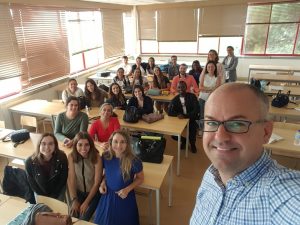Student Loans – further sales
On Wednesday the Government announced their intention to sell off another set of student loans (written statement here). Angela Rayner Labour’s Shadow Education Secretary was granted an Urgent Question within Parliament to raise the sale and requested a statement from Universities Minister Sam Gyimah. Sam stated:
- I want to explain to the House the rationale for the sale of the student loan book and make some important points. The sale will categorically not result in private investors setting the terms or operating the collection of repayments. Loans in scope will continue to be serviced by Her Majesty’s Revenue and Customs and the Student Loans Company on the same basis as equivalent unsold loans. Investors will have no right to change any of the current loan arrangements or to directly contact borrowers. Furthermore, the Government’s policies on student finance and higher education are not being altered by the sale. These older loans, the borrowers of which benefited from lower tuition fees and lower interest rates, are not in the scope of the current review of post-18 education and funding.
- The sale represents an opportunity for the Government to guarantee money up front today, rather than fluctuating and uncertain payments over a longer period. That will allow the Government to invest in other policies with greater economic and social returns. We will proceed with the sale only if market conditions remain favourable and if the final value-for-money assessment is positive.
Angela Rayner continued to question the Minister stating the sale related to £4 billion of the student loan book and requesting for a valuation of the loans up for sale (it wasn’t provided). She also highlighted that the National Audit Office findings suggested the DfE made a loss of £900 million on the previous student loan book sale, with £600 million in future income lost. Finally she asked:
- Will the Minister confirm that when the sales go ahead the Government will lose a source of income for as long as 25 years in exchange for a one-off payment? Can he give us any justification for the policy of selling off an asset to flatter this Government’s terrible position on national debt? With nearly £1 billion lost in the previous sale, just how low would the sale price have to go before the Government decided that selling simply was not worth it?
- Sam Gyimah responded: Student loan sales in this country have happened over nearly two decades. This is not new…The National Audit Office did refer to the write-down of the loan book, but anybody who has studied accounting will know that the present value of a future income stream will be lower than the value if one waited 30 years. In capturing some of that money, the Government can invest in vital public services today, and that is the rationale for selling the student loan book…The sale will also be good for the taxpayer. Once people have been to university, it serves no public purpose to have the money tied up. The sale will release that money to invest in other priorities. On the valuation, the face value of the sale is £3.9 billion, but what we will do and how we will look to proceed will ultimately depend on market conditions.
The Lords were also granted a debate on the topic and picked up where Angela Rayner left off.
- Lord Watson of Invergowrie (Labour): I listened to Mr Gyimah’s exchange today with my colleague Angela Rayner, the shadow Secretary of State. Unfortunately, he dodged all of her questions on the valuation of the loans the Government are selling. He simply confirmed that the Government would forgo the 25-year revenue stream in favour of a one-off receipt…The Government have said that the revenue from selling off student loans now will enable them to invest in vital public services today. We all know that the Treasury has the final say on specifically where this windfall will go, but surely most, if not all, of it should be reinvested in the education budget; goodness knows there is a need for it.
- In a later statement Angela Rayner, commented: “The last time the Tories sold off a slice of the student loan book they lost hundreds of millions of pounds, yet this latest announcement shows they have learnt absolutely nothing…These repeated experiments with privatisation are not in the interests of either taxpayers or the students facing a mountain of debt for a university education… instead of fixing the problem the Tories are resorting to a short-term fix at a long-term cost to the country.
MoneySavingExpert.com immediately blogged to reassure students their repayments wouldn’t be affected by the proposed sale. MoneySupermarket have a breakdown of student spending which highlights a £142 weekly shortfall in the student loan against outgoings.
Brexit: EU Students and Staff
Wonkhe report: Higher education staff who are EU residents are to be prioritised in a new phase of the EU Settlement Scheme pilot, which will open in November. Eligible to apply are those who are employed by or work at a higher education institution or overseas higher education institution in the UK which is classified as such on the Tier 4 Register of licensed sponsors. The new phase will be a further pilot to scale up the testing of the scheme in addition to HE staff it also covers the health and social care sector. The new phase will open on November 1 and will run until 21 December this year.
Alistair Jarvis, Chief Executive of Universities UK, stated:
“There are nearly 50,000 EU nationals working in UK universities and they make a vitally important contribution to our campuses and communities. Many leading researchers and key university staff in the UK are from other EU countries. This enables our universities to maintain their world-class excellence in teaching and research. Highly trained international technical, professional and support staff also play an important role in our universities.
“We welcome the news therefore that they will be able to obtain settled or pre-settled status as one of the earliest groups in the scheme. This will provide much needed clarity for our EU staff and for universities. It is vital for our economy and society that the UK retains and continues to attract the best and brightest from across Europe post-Brexit.
The Immigration Minister also stated the government’s intention to double the Immigration Health Surcharge (HIS) to £400 per year (or £300 per year for students). This change will require ratification in Parliament by both the House of Commons and the House of Lords.
AI & Industrial Strategy
Next Tuesday the Education Committee will meet Pepper the robot who will answer questions in a session on the Fourth Industrial Revolution. Pepper is part of an international research project developing the world’s first culturally aware robots aimed at assisting with care for older people. The Committee will hear about her work with students across the faculties at Middlesex University, including a project involving teaching primary level children, and what role increased automation and robotics might play in the workplace and classroom of the future. After a demonstration by Pepper, the Committee will explore with witnesses, including those from Middlesex University, how robots can be used to support learning, and the skills needed to adapt to the growth in artificial intelligence and automation.
UTCs
University Technical Colleges (UTCs) are in the news again with the Guardian drawing on the Education Policy Institute (EPI) report which finds UTCs ineffective as 50% of students drop out. UTCs are for 14-19 year olds, with a strong focus on technical education. They are sponsored by universities and supported by employers. The EPI report notes that there are 50 UTCs open in England. An additional 10 having closed or fundamentally changed into a different institution type in recent years.
UTCs: provision and characteristics
- Many UTCs are struggling with student numbers. A third of students are enrolled at one of the 20 UTCs with decreasing student numbers.
- A huge proportion of UTC students are dropping out after two years. Over half of students enrolled leave between the ages of 16 and 17, failing to progress from Key Stage 4 (14-16) into Key Stage 5 (16-18). Students with lower GCSE results, special educational needs and those from disadvantaged backgrounds are the least likely to continue.
- These significant drop-out rates in UTCs continue after age 16. Those that remain for post-16 study are still far less likely to complete their final studies than students in other types of education:
– 63% of UTC students studying broader vocational qualifications completed their final assessment, compared to 83% nationally.
– 69% studying occupation-specific qualifications finished, compared to 81% nationally.
– For A-levels, 80% of students finished, compared to 94% nationally.
- A large proportion of UTCs receive poor inspection outcomes from Ofsted:
– 1 in 5 were rated ‘inadequate’ – twice the national average.
– 2 in 5 were rated ‘requires improvement’ – four times more than the national average.
– Just 4% were rated ‘outstanding’ – compared to 22% of secondary schools.
Progress and outcomes of students in UTCs
- UTC students make almost a whole grade less progress between leaving primary education and the end of Key Stage 4 than other students in state-funded schools. Significantly, this poor progress is particularly acute for high attainers, who make over a grade’s less progress than high attainers in all state-funded schools. When considering maths alone, UTC students as a whole lag behind by almost half a grade. Only around half of UTC students achieve at least a pass in GCSE English and maths, compared with two-thirds nationally.
- UTC students who stay on to study A levels also perform below the state funded average. The average grade obtained at A level in UTCs is a D, compared to the average of a grade C in all state funded institutions. However, students taking technical and vocational qualifications at a UTC perform close to the national average – but higher than those in Further Education colleges. On average they achieve a distinction in applied general qualifications (mainly BTECs) and Tech levels.
- UTC students perform well when retaking their GCSEs – improving their grades in English and maths by around a third of a grade.
- 20% of Key Stage 5 leavers go on to do an apprenticeship, three times the national average (7%), suggesting that UTCs are delivering good school-work transitions.
Supporting skills needs in the economy
- UTCs offer more technical pathways than other school types, with students much more likely to choose to study STEM subjects: 10% of UTC Key Stage 4 entries are in computer science (2% are nationally), 8% are in chemistry and/or physics (twice the national average), 16% in science general/combined (12% are nationally). All these calculations exclude English and maths.
- UTCs are ensuring students are trained for jobs in technical industries where high-skilled employment is expected to grow. Employment growth is projected in sectors that UTCs specialise in such as construction, IT, and health. This could present increased employment opportunities for students in UTCs.
Recommendations
- The government should consider changing the admissions age for UTCs from 14 to 16. While it is common in other countries for students to make a transition in education before 16, England essentially has a pre- and post-16 system. UTCs have struggled with admissions at age 14. With poor levels of progress and retention, it is not clear that students are benefiting from a 14-19 education.
- With provision starting at age 16, UTCs should focus on delivering high-quality existing technical qualifications and eventually the new ‘T-levels’ – relevant to local and national skill needs. With UTCs only focusing on ages 16-18, this would give them an opportunity to deliver differentiated, specialised, high-quality technical education. This should allow UTC students to progress to higher levels of technical education in Institutes of Technology, National Colleges, university, or other providers, should they wish to pursue further study.
- Better measures are needed that account for the technical-oriented provision of UTCs. Improved destination measures are needed that also account for the characteristics of students, so that the particular intakes of UTCs can be taken into account.
Misrepresentation of Official Statistics: Schools
Last week Nick Gibb, Minster of State for School Standards stated the UK’s spending on education was the third highest in the world. It hit the headlines as it controversially included university student tuition loans as well as fees paid by private school pupils and positively misrepresented literacy rankings. The UK Statistics Authority criticised here, the letter highlighting it was the fourth time in the last 12 months the DfE has misused statistics. Damian Hinds, Secretary of State for Education, responded here providing alternative statistics to blur the lines of the previous misuse. Whereas the Permanent Secretary within the DfE, Ed Humperson, was willing to hold his hands up and say they’ll do better in this letter.
The future of UK research funding
From Research Professional: The House of Commons science and technology committee has published the written evidence for its ongoing inquiry into the balance of UK research funding. This inquiry was launched in July, two months after UK Research and Innovation published a strategic prospectus in which it announced that it was carrying out an internal review of the balance of funds between the research councils, Research England, Innovate UK and interdisciplinary research. It seems that UKRI would like to alter the balance in favour of more research across disciplinary boundaries and possibly more research that yields impact in its many forms.
It is interesting to look at who submitted evidence – not very many universities, although the Russell Group (and some of their members individually), UUK and GuildHE made submissions, alongside many of the Societies and Academies, the Wellcome Trust etc. So did the Department for BEIS.
Widening Participation, Students’ Achievement and Outcomes
A thought provoking blog on Wonkhe this week: Beyond school qualifications: how to make admissions truly inclusive. It tackles the false positives (admitting a student when it would have been better to decline) and false negatives (not offering to a student who would have done well) and considers the influence of a range of WP factors. The article favours foundation years to tackle the false negatives, and considers how efforts could be scaled up to admit on a different basis for a wider range of courses. It also highlights the pros and cons of the radical French université open access system.
The Office for Students published an early evaluation of the Addressing Barriers to Student Success programme covering the first year of programme delivery. It looks at how the programme is working, lessons learnt, and potential for cross-institutional partnerships as enablers for trialling and scaling up as well as the organisational and pedagogical approaches that seek to address differential student outcomes. Figure 3.5 on page 22 lists some of the successful activities which have addressed student success so far and page 33 has a what works diagram:
Finally the recommendation is for a three year programme (rather than the intended two) otherwise the results of the interventions will now be known and that the OfS should consider the academic calendar when funding programmes of this nature.
Parliamentary Questions
This week there were parliamentary questions on whether Pupil Premium is being used to supplement core funding, on the opt-in requirement for universities to share student mental health status information with parents, and on transition to university (mental health). Another question tackled the recruitment of Social Mobility Commissioners, the answer simply stated the recruitment was ongoing and no information would be released until the process concluded (and a further ask on the Commission recruitment attempted to establish how many applicants were solicited or unsolicited – same no response was given). . Sam Gyimah also answered a parliamentary question on student mobility study abroad programmes responding that such schemes still focus on the UK participating in the Erasmus successor programme. A further question on unconditional offers highlighted the tasking of the OfS to assess the impact unconditional offers may have on A level attainment. Finally there was a question on childcare support:
Q- David Simpson: To ask the Secretary of State for Education, whether his Department has a policy on helping students with children to study at university while providing childcare support.
A – Sam Gyimah:
- The government recognises the value of parents continuing in, or returning to, education and provides support to those enrolled on recognised education courses. Eligible student parents may be able to claim a Childcare Grant, which offers support with up to 85% of their childcare costs, depending on their household income. The maximum Childcare Grant for the 2018 to 2019 academic year is: Up to £164.70 a week for one child. Up to £282.36 a week for two or more children. Parents’ Learning Allowance is additional funding to help students who are also parents. This can be used for everyday costs of study, such as books, study materials and travel.
League tables
Birkbeck has announced that it will no longer participate in UK league tables. Their statement notes good REF outcomes and a sliver TEF, but says that their league table position “gives a totally misleading view of the College”.
- Entry tariffs – UK rankings reward universities for high entry grades, measuring inputs rather than outcomes. Birkbeck admits a wide range of students at different stages of their lives to widen access to education. To do this it has flexible entry requirements rather than strict rules about A level grades – the majority of students are mature and while many have valuable work experience, they may have been outside formal education for some time. Birkbeck’s flexible entry grades have the effect of pulling it down the rankings and, in effect, this penalises the College for its mission.
- Retention rates – Birkbeck’s students are often working or caring during the day and more vulnerable to changes in circumstances elsewhere in their lives. To compare this cohort with school leavers learning through daytime teaching elsewhere in the sector is misleading. Tables measure full-time students only. Birkbeck actually has one of the highest completion rates for part-time students in the sector. This reflects our expertise in supporting students combining work, family and other commitments with their degrees.
- Student spend – As Birkbeck students are taught in the evening, and often work during the day, the College does not provide its own dedicated leisure facilities (although students have access to the facilities shared by all members of the University of London). Again these mean Birkbeck’s score is reduced in domestic tables.
This is really a criticism of the over-simplified view that league tables give, compared to (say) the TEF (much criticised in its own right, of course, but much more nuanced). The first point above is one that will resonate with many across the sector. Progression from year 1 to year 2 is of course a metric in the TEF, which uses benchmarks so that Birkbeck would not be penalised for its model.
Postgraduate Research Experience Survey
Advance HE published the Postgraduate Research Experience Survey 2018. They note that 16,000 postgraduates responded to the survey and list the key findings as:
- Postgraduates researchers continue to rate their experience positively, with 8/10 who are satisfied overall. However, this represents a 2% decline since 2017.
- They were positive about their supervision, with 9/10 PGRs satisfied with their supervisors’ knowledge, feedback and availability. Postgraduates were less positive about the research culture, with 63% of respondents reporting positively.
- In contrast to undergraduate survey findings, PRES 2018 results indicate that UK domicile students of black ethnicity are the most likely to believe their research degree programme is worthwhile; and, again in contrast to the Advance HE – HEPI Student Academic Survey, postgraduate students working long hours in paid employment did not appear to be disadvantaged.
- PGRs with a disability, however, were less positive about their experience, facing increasing challenges as they progress through their studies.
The OfS have also issued an invitation to tender for a taught postgraduate student survey. It is described as an exploratory sample based survey intended to gather responses from around 30,000 PG students.
To accompany the tender announcements Conor Ryan, from the OfS wrote a Wonkhe blog: Listening to the postgraduate student voice.
Advance HE will publish the Postgraduate Taught Experience Survey (PTES) later this month, and the UK Engagement Survey next month.
Freedom of speech
Research Professional continues what might be called a campaign to call the Minister out on his pronouncements on free speech. The latest was in the playbook last week.
Playbook readers are familiar with the occasions it has been our journalistic duty to fact-check the claims of the universities minister Sam Gyimah during his campaign for free speech on campus. It was a surprise, then, to read over the summer an interview with the minister, given to the think tank Bright Blue, in which he said he had “received countless emails and letters from students saying that free speech on their campus is being threatened or impeded”. Wondering what amounted to “countless” these days, Playbook submitted a freedom of information request to the Department for Education. We asked for details of how many emails the minister had received from students on this topic. Sadly, the department was unable to comply with our request.
It said: “‘Free speech’ is such a widely applied term, it is impossible to narrow down all of the correspondence related to this subject.” We were told that the information was held in a “correspondence logging system” and not on a spreadsheet. “So the department estimates that the cost of complying with your request would exceed the cost threshold applicable to central government. This is £600 and represents the estimated cost of one person spending 3.5 working days locating, retrieving and extracting the information,” the department said.
Other news
Sexual Misconduct: AMOSSHE published an Insight report which researched students’ expectations of their universities following reporting or disclosure of sexual misconduct by or against students. The report notes a reluctance to report sexual misconduct and that emotional wellbeing support is crucial to student’s following disclosure.
UTCs: University Technical Colleges (UTCs) are in the news again with the Guardian drawing on the Education Policy Institute report which finds UTCs ineffective as 50% of students drop out.
Universal Credit: There has been significant hand wringing from the Conservatives over Universal Credit in recent times. FE News runs an article (written by Dept for Work and Pensions) on Universal Credit setting out the exceptions to the rule that full time students cannot claim Universal Credit.
A (short-ish) technical blog on HEPI this week discusses aligning Post-18 Entitlements and Apprenticeship Funding. It provides some facts and figures from level 2 to level 4. It concludes:
Arguably more thought needs to be given to publicly funded re-skilling entitlements. Potential options include:
- an all-age entitlement to free tuition for a second full Level 2;
- positioning fee-loans as the only source of public funding for subsequent Level 3 qualifications;
- creating separate part-time HE and adult FE fee-loan budgets for subsequent Levels 4 to 6 qualifications; and
- funding short courses through the National Retraining Scheme.
EEA Workers: Those following the Migration Advisory Committee’s EEA workers investigation and reporting may find this UCEA webpage interesting. It brings together the major sources on the topic and publishes the UCEA red amber green briefing response to the committee’s report.
Brexit – No deal prep: On Friday the Government released more guidance for various sectors on how to prepare for Brexit should we leave the EU with no deal.
Chief Scientific Adviser (Foreign and Commonwealth Office): Professor Carole Mundell was announced as the new Chief Scientific Adviser. She will also continue in her role as Professor of Extragalactic Astronomy at Bath University. The Chief Scientific Adviser represents UK science interests internationally, using science relationships to deliver the UK’s foreign policy priorities. She will work closely with the UK’s Science and Innovation Network to facilitate links between British and international scientists to drive future economic growth; tackle global challenges such as Anti-Microbial Resistance, Patient Safety, girls’ education and to support the conservation and sustainable use of the Ocean.
- Professor Mundell commented: Science is an international endeavour and is most effective when it draws on diverse talent to push the frontier of knowledge and tackle the biggest challenges facing our planet. I am honoured to have been appointed FCO CSA and am excited to work with the UK’s Science and Innovation Network and add value to the FCO’s prosperity and security work around the world.
Subscribe!
To subscribe to the weekly policy update simply email policy@bournemouth.ac.uk
JANE FORSTER | SARAH CARTER
Policy Advisor Policy & Public Affairs Officer
66724 65070
Follow: @PolicyBU on Twitter | policy@bournemouth.ac.uk




 On Wednesday, 10th October 2018, BU staff had an opportunity to find out more about current EU funding opportunities. Delivered by BU institutional representative in Brussels, Andreas Kontogeorgos, presentations covered such topics as Brexit, forthcoming ICT calls, COST Actions and MSCA Innovative Training Networks.
On Wednesday, 10th October 2018, BU staff had an opportunity to find out more about current EU funding opportunities. Delivered by BU institutional representative in Brussels, Andreas Kontogeorgos, presentations covered such topics as Brexit, forthcoming ICT calls, COST Actions and MSCA Innovative Training Networks. BU staff considering applying for any of these calls and other international funding, should contact international research facilitator Ainar Blaudums or other RKEO’s representatives at their faculties, for further information and support.
BU staff considering applying for any of these calls and other international funding, should contact international research facilitator Ainar Blaudums or other RKEO’s representatives at their faculties, for further information and support. Last week I spent a day up in London at the BBC’s News Centre working with former colleague and BU’s honorary Doctor of Letters
Last week I spent a day up in London at the BBC’s News Centre working with former colleague and BU’s honorary Doctor of Letters 














 REF Code of Practice consultation is open!
REF Code of Practice consultation is open! BU Leads AI-Driven Work Package in EU Horizon SUSHEAS Project
BU Leads AI-Driven Work Package in EU Horizon SUSHEAS Project Evidence Synthesis Centre open at Kathmandu University
Evidence Synthesis Centre open at Kathmandu University Expand Your Impact: Collaboration and Networking Workshops for Researchers
Expand Your Impact: Collaboration and Networking Workshops for Researchers ECR Funding Open Call: Research Culture & Community Grant – Apply now
ECR Funding Open Call: Research Culture & Community Grant – Apply now ECR Funding Open Call: Research Culture & Community Grant – Application Deadline Friday 12 December
ECR Funding Open Call: Research Culture & Community Grant – Application Deadline Friday 12 December MSCA Postdoctoral Fellowships 2025 Call
MSCA Postdoctoral Fellowships 2025 Call ERC Advanced Grant 2025 Webinar
ERC Advanced Grant 2025 Webinar Update on UKRO services
Update on UKRO services European research project exploring use of ‘virtual twins’ to better manage metabolic associated fatty liver disease
European research project exploring use of ‘virtual twins’ to better manage metabolic associated fatty liver disease